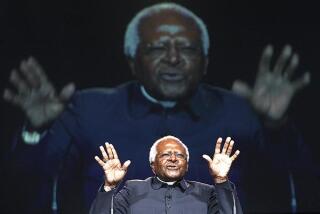Not-So-Powerful Stuff
Secretary of State George P. Shultz’s address on South Africa to a New York meeting of business leaders was a disappointment--hardly the “powerful stuff” touted by a State Department briefing officer. Some of his words were suspiciously similar to the rhetoric of “constructive engagement” that dominated the first six years of President Reagan’s relations with Pretoria.
There were nevertheless positive elements that could be the basis for movement. Shultz singled out for particular praise the meeting last July in Senegal that brought together distinguished Afrikaners from South Africa and leaders of the African National Congress, the outlawed movement that appears to enjoy the broadest support among South African blacks. That meeting was followed in recent days by another in Zimbabwe that again showed the enormous potential for dialogue and common ground between the leading black nationalist movement and the white moderates.
Shultz also spelled out for the first time, although in generalities, the kinds of democratic solutions that he deems appropriate for South Africa. His solutions include equal rights for all without regard for race, language, national origin or religion, and a democratic electoral system with universal franchise for all adults--a prescription for the very kind of equal voting rights that the black majority has been seeking.
But his optimistic assessment of “efforts to expand communications between the races” failed to note that those efforts have been inspired by persons out of political power, and have been roundly criticized and often obstructed by people in power. His optimistic assessment should have been balanced by recognition that the May 6 national election, restricted to white voters, was won overwhelmingly by those resisting reform.
Shultz shunned the word sanctions in his speech. That was curious, for his announced intention was to strengthen the moderates working within South Africa for peaceful change--the very people who largely favor economic sanctions. But he may have been setting the stage for today’s State Department report on the first year of operations under the sanctions imposed by Congress over Reagan’s objections. The report is expected to argue that the sanctions have failed to win change and have reduced American influence--both stale arguments to defend passivity, the very passivity that has reinforced Pretoria’s stubbornness.
More to Read
Sign up for Essential California
The most important California stories and recommendations in your inbox every morning.
You may occasionally receive promotional content from the Los Angeles Times.










